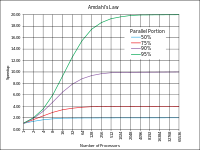- Cost efficiency
-
Cost efficiency (or cost optimality), in the context of parallel computer algorithms, refers to a measure of how effectively parallel computing can be used to solve a particular problem. A parallel algorithm is considered cost efficient if its asymptotic running time multiplied by the number of processing units involved in the computation is comparable to the running time of the best sequential algorithm.
For example, an algorithm that can be solved in O(n) time using the best known sequential algorithm and
 in a parallel computer with O(p) processors will be considered cost efficient.
in a parallel computer with O(p) processors will be considered cost efficient.Cost efficiency also has applications to human services.
References
- Advanced Computer Architectures: A Design Space Approach, D. Sima, T. Fountain and P. Kacsuk, Addison-Wesley, 1997.
Parallel computing General 
Levels Threads Theory Elements Coordination Multiprocessing · Multithreading (computer architecture) · Memory coherency · Cache coherency · Cache invalidation · Barrier · Synchronization · Application checkpointingProgramming Hardware Multiprocessor (Symmetric · Asymmetric) · Memory (NUMA · COMA · distributed · shared · distributed shared) · SMT
MPP · Superscalar · Vector processor · Supercomputer · BeowulfAPIs Ateji PX · POSIX Threads · OpenMP · OpenHMPP · PVM · MPI · UPC · Intel Threading Building Blocks · Boost.Thread · Global Arrays · Charm++ · Cilk · Co-array Fortran · OpenCL · CUDA · Dryad · DryadLINQProblems Embarrassingly parallel · Grand Challenge · Software lockout · Scalability · Race conditions · Deadlock · Livelock · Deterministic algorithm · Parallel slowdown
Categories:- Parallel computing
- Computer science stubs
Wikimedia Foundation. 2010.
